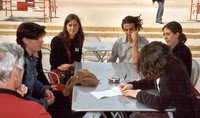French students fight against Sarkozy's reform
A French university has long ago figured among the world's top colleges, and there is no reason to change the system.

Across the country, they are hunkering down for what could prove a bitter fight against a new law aimed at making French public universities - once reputed to be among the best in the world - globally competitive again.
The growing student protest movement has dovetailed with transit strikes this week that hobbled rail transport in France. Together, the two protests show the obstacles faced by new President Nicolas Sarkozy as he seeks thorough reform for France. So far, he has refused to cave to the pressure.
Of France's 85 state-run universities, 36 were shuttered, blockaded or otherwise disrupted by protesters on Friday, the main student union said. The demonstrations began among leftist activists at a handful of campuses last month and have slowly grown, although they are so far much smaller than massive student protests in 2006.
The students are seeking to overturn new legislation that paves the way for private investment in universities. The law's critics say that change could turn universities into puppets of private corporations and kill off fields of study that do not make money.
So barricades have gone up.
Student grievances are separate from those of transit workers striking over plans to trim their retirement benefits, public sector workers angry over jobs cuts and judicial officials dismayed by plans to shut some court houses.
But the risk for Sarkozy is that the variety of protest actions could together create a volatile atmosphere of rebellion against his reform drive.
The transit strike appeared to lose some steam Friday. But the student protests have snowballed, even though students are divided on the movement's tactics of blockading classes, which many oppose.
Students have proven to be a powerful force in French politics in the past and have quashed previous attempts at university reform.
Student protesters humiliated Sarkozy's predecessor, Jacques Chirac, in 2006 with protests that forced him to withdraw legislation that would have made it easier to hire and fire young workers.
So far, these protests cannot compete with those of 2006 for scale. Only about 200 students attended a protest gathering Friday in Paris.
Sarkozy's university legislation - which was passed while students were away on summer holiday - takes much of its inspiration from the U.S. system. It gives universities more control over their budgets and personnel and allows them to attract outside investment.
At the sprawling, dilapidated campus of Nanterre University, west of Paris, the failings of the French model are hard to ignore: The paint is flaking, there are no lights in many of the graffiti-covered bathrooms and the amphitheater resembles a prison block.
The place clearly could use some work, but student Pierre Gaspar insists that if money for repairs were to come from the private sector, he would just as soon pass.
"Companies never give out of altruism," Gaspar said. "They always want something in return."
The 19-year-old sociology major fears that noncommercial fields of study, like philosophy and literature, would fall by the wayside if universities get corporate funding.
Private investment has long been common at U.S. universities, where companies routinely help fund research, especially in the sciences.
Cutting-edge research has helped make American universities among the world's most prestigious. According to the University of Shanghai's world ranking of universities, in 2005, the top French university placed 46th, behind more than 30 American institutions.
Nanterre administrators welcome the new law as a chance to revamp the university that has roughly 30,000 students.
"Supplementary funding could help develop research and better our student orientation and teaching," the vice president, Bruno Lefevbre, said in a telephone interview. The law "put French universities on equal footing with other schools around the world."
Yet Nanterre students were among the first to demonstrate.
Earlier this week, they voted to shut down the campus. The university president called in riot police, who used tear gas to dislodge the protesters, fanning further anger among students.
The transit strike has cooled tempers at the university - at least for now. With limited train service, few students were able to commute to the suburban campus, and barricaded buildings reopened.
But student organizers have pledged to return soon. Another vote on whether to shut down the site again is expected on Monday.
"If we allow Sarkozy to implement this law, there will be no stopping him," said psychology major Sara Bracchi. "This will be the first step to the total Americanization of French universities."
Subscribe to Pravda.Ru Telegram channel, Facebook, RSS!


